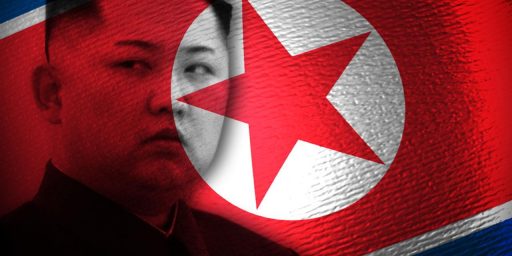THE LITERAL LEFT
Christopher Hitchens asks a reasonable question: Have opponents of the war been vindicated? Not surprisingly, given his support of the war, he says, No. But his argument is reasonably convincing, tying together a lot of disparate pieces of information–many of which I’d forgotten.
. . . David Kay report has received such a grudging audience for its important findings. I pause to note, just for my own sake, that the report contains a photograph of laboratory equipment stacked in a mosque. Much more salient is the story of Saddam’s dealings with Kim Jong-il, which was written up at length by David Sanger and Thom Shanker in the New York Times on Dec. 1.
You may remember the secret and disguised shipload of North Korean Scuds, intercepted on its way to Yemen by the Spanish navy just before war began last March. Now downloaded hard drives from Iraqi government computers, plus interviews with Iraq officials and scientists, have established that Saddam Hussein was trying to buy Rodong missiles from Pyongyang and was hoping to purchase the rights to the North Korean production line. The significance of this is obvious enough: The Rodong missile has a range much greater than that prohibited to Iraq by the U.N. resolutions. It also makes sense: North Korea is bankrupt and starving and exports only weapons and drugs while Saddam’s Iraq had plenty of spare off-the-record cash in American dollars. The intended transshipment point and the site of the negotiations, Syria in both instances, also indicates that Syria has long been at least a passive profiteer from the sanctions imposed on its neighbor.
Even more interesting is the fashion in which the deal broke down. Having paid some $10 million dollars to North Korea, the Iraqi side found that foot-dragging was going on–this is the discussion revealed on one of the hard drives–and sought a meeting about where the money might be refunded. North Korea’s explanation for its slipped deadline was that things were getting a little ticklish. In the month before the coalition intervened in Iraq, Saddam’s envoys came back empty-handed from a meeting in Damascus. It doesn’t take a rocket scientist (just for once I can use this expression without toppling into cliché) to deduce that the presence of a large force all along Iraq’s borders might have had something to do with North Korea’s cold feet.
So the “drumbeat” scared off the deal-makers, and Saddam Hussein never did get Rodong missiles, which might have been able to hit targets far away from Iraq. Elsewhere in the Kay report, there is convincing evidence that Iraqi scientists were working on missiles, and missile fuels, with ranges longer than those permitted by the United Nations. So there is an explanation for why the completed and readied material was never “found” by inspectors before or after the invasion: It hadn’t been acquired quite yet. Which meant that Saddam could not confront the international community in the way that North Korea has lately been doing, by brandishing weapons that do in fact have deterrent power. As in previous cases–the parts of a nuclear centrifuge found in the yard of Iraqi scientist Mehdi Obeidi, for example–the man in charge of these covert weapons programs was Saddam’s son Qusai. I find I can live with the idea that Qusai never got to succeed his father as Kim Jong-il did. Imagine a North Korea, with attitude, on the sea lanes of the Persian Gulf–and with “deniable” but undeniable ties to al-Qaida. That was in our future if action had not been taken.
I suspect none of this will be compelling to those who opposed the war. It does remind me, though, of why I ultimately supported it after months of skepticism: the North Korean example. We had a whole lot more options against a non-nuclear Saddam than against a nuclear Kim.



There were predictions made by the peaceniks, too, that haven’t come literally true, or true at all. There has been no refugee exodus, for example, of the kind they promised. No humanitarian meltdown, either. No mass civilian casualties. All of these things would of course come to pass, and right away, if the Iraqi “resistance” succeeded in sabotaging the coalition presence. But I refuse to believe that any antiwar person is so keen on vindication as to wish for anything like that.
Poor Mr. Hitches; once a starry-eyed idealist always a starry-eyed idealist. There aren’t many of them, but they do exist. The problem is not that they exist–kooks are the only universal constant of political life, much like entropy is to physics–but rather that they are listened to & wield great influence within otherwise legitimate anti-war quarters.
—